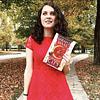Take a photo of a barcode or cover
challenging
emotional
informative
medium-paced
informative
inspiring
reflective
sad
slow-paced
Graphic: Cancer, Chronic illness, Death, Racism, Terminal illness, Blood, Medical content, Medical trauma, Death of parent, Pregnancy, Classism
challenging
emotional
informative
reflective
sad
slow-paced
dark
hopeful
informative
inspiring
medium-paced
emotional
informative
reflective
medium-paced
challenging
emotional
sad
medium-paced
Poverty. Casual Racism. Medical callousness. Scientists playing god. Poverty. Mental health issues. Moral conundrum. And yes immortal cells. This book covers it all and then some.
I went into this book blind and was blown away by it. This is a book about a woman’s cells that stayed on long after she died. But more importantly it’s about her daughter searching for answers about what happened to her mother. This is about a family robbed of not just Henrietta but also of knowledge about what happened to her & why her cells have continued to live & thrive and about the money that everyone other than them made.
I listened to the audiobook and the way Cassandra Campbell brings the entire book to life with her voice & accents of Henrietta, the family members and scientists it made me feel like I was actually listening to the people themselves.
Listen to it if you can. Read it if you can’t. But know this story. It’s about immortality and the price one family had to pay for it.
challenging
emotional
informative
reflective
medium-paced
informative
sad
slow-paced
I really enjoyed reading about the woman behind the HeLa cells. This is a great non-fiction about an African-American woman in the 1950s diagnosed with cervical cancer, whose doctor took her cells and cultured it without her consent. Her cells led to major medical science advancements and multi-million dollars made from selling her cells world wide. Her family only learns of everything 20 years later. It's definitely a great read for those who like non-fiction and history of medical research.
challenging
emotional
informative
reflective
sad
medium-paced
Oh boy, is there A LOT to unpack with this book. And honestly, I think that makes it an even stronger nonfiction read.
SYNOPSIS: Story of both the woman whose cells have led to countless medical research breakthroughs and the author who possibly exploited a family to make sure this story was told
I knew nothing about HeLa cells before I started this book. Sorry, I was way more into the Humanities and Liberal Arts in both high school and college.
So, learning more about the cells and the woman they came from was incredibly eye-opening. The amount of scientific breakthroughs that Henrietta Lacks is responsible for is INCREDIBLE. Incredible enough that it should have merited a mention in even the Humanities and Liberal Arts classes I took.
And that’s really what the issue this book covers is. No one really knew who Henrietta Lacks was. Part of that is due to basic medical research procedures of protecting individual’s privacy and part of that is because medical research tends to not care about the person being, you know, A PERSON.
Which is why Henrietta’s family had no idea that her cells were being used in all of this research and even struggled with what it meant for her cells to still be reproducing. And they also didn’t understand how their mother could be responsible for all of these medical breakthroughs but not receive any credit or compensation for it.
So, enter Rebecca Skloot, who went on a mission to learn more about the woman behind the HeLa cells and did so by basically hounding the family and everyone who ever spoke to Henrietta Lacks.
And judging by the one-star reviews on this book, some people really have a problem with that. Skloot is a white woman (something she herself says throughout the book) essentially gatekeeping Henrietta Lacks’s story.
But at the same time, if she wasn’t so persistent in her research, I would not know who the hell Henrietta Lacks was.
Which is fascinating to me because this is very similar to the ethical conundrum surrounding medical research presented in this book.
You can do something that has good intentions and leads to a mostly positive outcome, but that may not always be 100% ethically right.
Like the case with Henrietta Lacks. Her cells were taken from her without her permission because that was the standard procedure at the time. The cells continued to be used without her permission doing a multitude of good throughout the world.
So, the question is would Henrietta have given permission to take her cells if she knew they were going to be used for more than just seeing what kind of cancer she had?
And it’s a question that her children grapple with throughout the book. Because on one hand, they say that they believe their mom would be happy to know how many people her cells have helped. But on the other hand, that’s still a part of their mom that was taken from her without permission and medical researchers continue to use to this day without Henrietta or the family receiving any recognition or compensation.
Which leads us back to the moral quandary with the author basically being a huge part of this story and inserting herself into the family’s life. Would Henrietta receive the recognition she deserves if this book did not exist?
This is why most nonfiction authors try to remove themselves from the narrative because it does bring up ethical questions. But in Skloot’s case, her interactions with the family highlight their distrust of the medical community based on things they have dealt with concerning their mother’s cells. And they are justified in these views.
Skloot also highlights the wealth inequality that the Lacks family lives in, and the irony that their mother is responsible for all of this successful medical research while they themselves cannot access affordable health care.
This portrayal of the family is often not flattering, but I did feel like Skloot has a lot of empathy for them and ultimately does want to provide some sort of justice for them and their mother’s legacy.
I love books that make me think but also don’t have a 100% right or wrong answer, and this one does that on so many levels.
I’m happy to hear that this book has been taught in schools because I think it’s a great tool to learn more about the ethics behind medical research, the history of people of color being used for unethical medical research, and also issues within our healthcare system.
It is a nonfiction book that I think everyone should read because it will generate some incredibly rich discussion that can also be uncomfortable. And I think we often learn best from these uncomfortable conversations about injustice.





